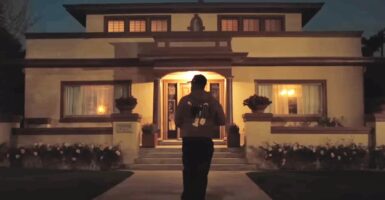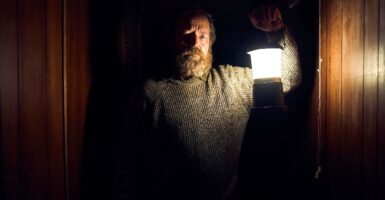Virtual Game Helps Blind People Navigate Unfamiliar Locations
This article is more than 2 years old
 Usually, a science paper about even the simplest subject will have a title that either obscures the study’s purpose from layman eyes, or it over-explains things, using ten words where six would do.
Usually, a science paper about even the simplest subject will have a title that either obscures the study’s purpose from layman eyes, or it over-explains things, using ten words where six would do.
However, the Journal of Visualized Experiments video article titled “Development of an Audio-based Virtual Gaming Environment to Assist with Navigation Skills in the Blind” is a fair assessment of what’s going on in the report, and sounds a little better than just saying, “Video games for blind people!” and high-fiving everyone in the room. Dr. Lotfi Merabet, a clinical neuroscientist out of Harvard, led the study, which tested whether or not using audio cues in specified virtual environments, such as a home or office, could be used to help the blind when actually visiting the real-life equivalent.
A participant was given a set of headphones and sat in front of a computer program with a map of an unfamiliar building on it. After being told keyboard functions, the subject can then explore the building, with location-specific audio cues alerting them of things nearby. The participant was then given a mission to retrieve jewels from within the building and to bring them outside. To be expected, though it’s still quite amazing, the player’s mental layout of the building was cemented, and when it came time to perform the tasks in the physical building from the game, they were able to complete them significantly quicker than their virtual selves. While it seems like common sense, not a lot of research in this particular area exists, and sighted people often take for granted just how difficult navigation can be. Finding your pants in the dark doesn’t count.
“For the blind, finding your way or navigating in a place that is unfamiliar presents a real challenge,” says Merabet. “As people with sight, we can capture sensory information through our eyes about our surroundings. For the blind that is a real challenge.”
So while it may not be practical for a blind person to study every building he or she will be going into and out of on a daily basis, it can be thought of as a Rosetta Stone for places instead of languages. Merabet and his team already have an Audio Based Environment Simulator (ABES) at the Carol Center for the Blind in Newton, Massachusetts, which they hope people can use to “learn room layouts more naturally than if they were just following directions.” And perhaps certain buildings and monuments can kind of open source their blueprints for the program, so that vacations can be even less burdensome.












